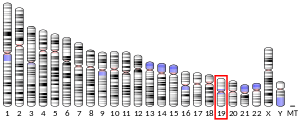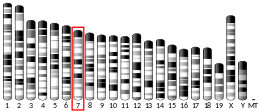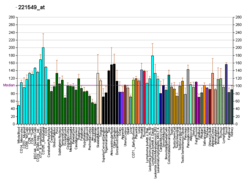GRWD1
Glutamate-rich WD repeat-containing protein 1 is a protein that in humans is encoded by the GRWD1 gene.[5][6]
| GRWD1 | |||||||||||||||||||||||||
|---|---|---|---|---|---|---|---|---|---|---|---|---|---|---|---|---|---|---|---|---|---|---|---|---|---|
| Identifiers | |||||||||||||||||||||||||
| Aliases | GRWD1, CDW4, GRWD, RRB1, WDR28, glutamate-rich WD repeat containing 1, glutamate rich WD repeat containing 1 | ||||||||||||||||||||||||
| External IDs | OMIM: 610597 MGI: 2141989 HomoloGene: 6644 GeneCards: GRWD1 | ||||||||||||||||||||||||
| |||||||||||||||||||||||||
| |||||||||||||||||||||||||
| |||||||||||||||||||||||||
| |||||||||||||||||||||||||
| Orthologs | |||||||||||||||||||||||||
| Species | Human | Mouse | |||||||||||||||||||||||
| Entrez | |||||||||||||||||||||||||
| Ensembl | |||||||||||||||||||||||||
| UniProt | |||||||||||||||||||||||||
| RefSeq (mRNA) | |||||||||||||||||||||||||
| RefSeq (protein) | |||||||||||||||||||||||||
| Location (UCSC) | Chr 19: 48.45 – 48.46 Mb | Chr 7: 45.83 – 45.83 Mb | |||||||||||||||||||||||
| PubMed search | [3] | [4] | |||||||||||||||||||||||
| Wikidata | |||||||||||||||||||||||||
| |||||||||||||||||||||||||
References
- GRCh38: Ensembl release 89: ENSG00000105447 - Ensembl, May 2017
- GRCm38: Ensembl release 89: ENSMUSG00000053801 - Ensembl, May 2017
- "Human PubMed Reference:". National Center for Biotechnology Information, U.S. National Library of Medicine.
- "Mouse PubMed Reference:". National Center for Biotechnology Information, U.S. National Library of Medicine.
- Gratenstein K, Heggestad AD, Fortun J, Notterpek L, Pestov DG, Fletcher BS (Jun 2005). "The WD-repeat protein GRWD1: potential roles in myeloid differentiation and ribosome biogenesis". Genomics. 85 (6): 762–73. doi:10.1016/j.ygeno.2005.02.010. PMID 15885502.
- "Entrez Gene: GRWD1 glutamate-rich WD repeat containing 1".
Further reading
- Nagase T, Kikuno R, Ohara O (Dec 2001). "Prediction of the coding sequences of unidentified human genes. XXII. The complete sequences of 50 new cDNA clones which code for large proteins". DNA Research. 8 (6): 319–27. doi:10.1093/dnares/8.6.319. PMID 11853319.
- Scherl A, Couté Y, Déon C, Callé A, Kindbeiter K, Sanchez JC, Greco A, Hochstrasser D, Diaz JJ (Nov 2002). "Functional proteomic analysis of human nucleolus". Molecular Biology of the Cell. 13 (11): 4100–9. doi:10.1091/mbc.E02-05-0271. PMC 133617. PMID 12429849.
- Trzcińska AM, Girstun A, Piekiełko A, Kowalska-Loth B, Staroń K (Dec 2002). "Potential protein partners for the N-terminal domain of human topoisomerase I revealed by phage display". Molecular Biology Reports. 29 (4): 347–52. doi:10.1023/A:1021237021338. PMID 12549820.
- Bouwmeester T, Bauch A, Ruffner H, Angrand PO, Bergamini G, Croughton K, Cruciat C, Eberhard D, Gagneur J, Ghidelli S, Hopf C, Huhse B, Mangano R, Michon AM, Schirle M, Schlegl J, Schwab M, Stein MA, Bauer A, Casari G, Drewes G, Gavin AC, Jackson DB, Joberty G, Neubauer G, Rick J, Kuster B, Superti-Furga G (Feb 2004). "A physical and functional map of the human TNF-alpha/NF-kappa B signal transduction pathway". Nature Cell Biology. 6 (2): 97–105. doi:10.1038/ncb1086. PMID 14743216.
- Andersen JS, Lam YW, Leung AK, Ong SE, Lyon CE, Lamond AI, Mann M (Jan 2005). "Nucleolar proteome dynamics". Nature. 433 (7021): 77–83. doi:10.1038/nature03207. PMID 15635413.
- Higa LA, Wu M, Ye T, Kobayashi R, Sun H, Zhang H (Nov 2006). "CUL4-DDB1 ubiquitin ligase interacts with multiple WD40-repeat proteins and regulates histone methylation". Nature Cell Biology. 8 (11): 1277–83. doi:10.1038/ncb1490. PMID 17041588.
- Olsen JV, Blagoev B, Gnad F, Macek B, Kumar C, Mortensen P, Mann M (Nov 2006). "Global, in vivo, and site-specific phosphorylation dynamics in signaling networks". Cell. 127 (3): 635–48. doi:10.1016/j.cell.2006.09.026. PMID 17081983.
This article is issued from Wikipedia. The text is licensed under Creative Commons - Attribution - Sharealike. Additional terms may apply for the media files.




